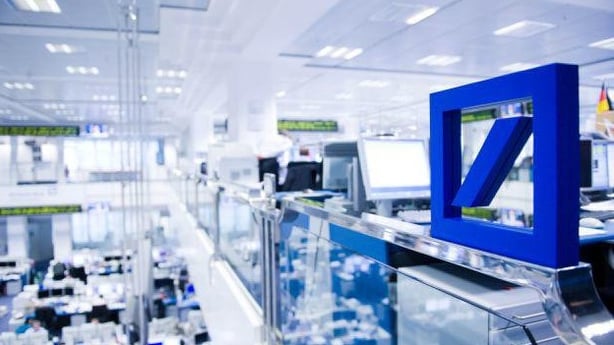The German government is pursuing discreet talks with US authorities to help Deutsche Bank secure a swift settlement over the sale of toxic mortgage bonds, according to sources in Berlin.
Until now, German officials have played down their role in the standoff, saying it is up to Deutsche to work out a deal with the US Department of Justice (DOJ).
The department is demanding up to $14 billion to settle claims the lender mis-sold mortgage-backed securities before the financial crisis.
But government officials in Berlin, speaking on condition of anonymity, told Reuters they hoped to facilitate a quick deal that would buy Deutsche Bank time to regain its footing.
One senior government official told Reuters there was "contact at all levels" between German and American officials.
Another source said Finance Minister Wolfgang Schaeuble was not planning to meet DOJ officials during a trip to Washington this week for International Monetary Fund meetings, but added: "You can hold talks. It doesn't have to be the minister."
Deutsche has been engulfed in crisis since news of the $14 billion US demand emerged last month.
It is fighting the fine but could have to turn to investors for more money if it is imposed in full.
The resolution of the crisis through a reduced settlement is crucial for Chancellor Angela Merkel, who faces a federal election next year.
Officials recognise that Germany's biggest bank, which employs around 100,000 people, cannot be allowed to fail.
Berlin is hoping a near-term settlement well below the mooted $14 billion will ease pressure on Deutsche Bank.
One government official said the ideal solution for Germany in the longer term would be a merger between Deutsche and its smaller domestic rival Commerzbank, even if it would be better to wait several years until both banks were cleaned up before sealing such a deal.
Berlin has previously declined to comment on the topic of bank mergers.

The official's comments about an all-German tie-up mirror the view of others in Berlin who spoke to Reuters on condition of anonymity, although it is unclear whether they represent official policy in the Chancellery.
"We are the biggest economy in the European Union, one of the world's leading exporters. We need a big bank with a European and international presence but which is anchored here in Germany," the official said.
Merging Deutsche with a European rival was fine in principle but only if Germans controlled the combined entity, the official added.
Worries over a major bank in Europe's largest economy have stirred painful memories of the 2007-2009 financial crisis and sent tremors through global markets.
The German Finance Ministry has denied it is working on a rescue plan for Deutsche. But government sources said it was crucial that trust was restored in the bank.
While this will take time and Deutsche's business model still needs work, agreeing a settlement with the DOJ would help alleviate the pressure on the bank, buying time for asset sales and possibly another capital hike.
As the German government considers its next moves, officials say that a number of previous cases involving European firms and US authorities are shaping its approach.
In pushing for a settlement with the US DOJ, Berlin is opting for a discreet approach, in part because it saw how France's aggressive public lobbying several years ago against a $9 billion fine imposed on BNP Paribas for violating US sanctions against Iran, Cuba and Sudan seemed to backfire.
The lessons of the Volkswagen diesel emissions scandal have also left their mark. The Wolfsburg-based carmaker initially tried to resolve the costly dispute by dispatching lower level officials to negotiate with the US.
When VW CEO Matthias Mueller finally addressed the issue during a visit to the Detroit car show in January, he stumbled during an English-language interview with NPR, attributing the scandal to a "technical problem" and denying the company had deliberately deceived.
The ensuing storm forced him into an embarrassing backtrack.

